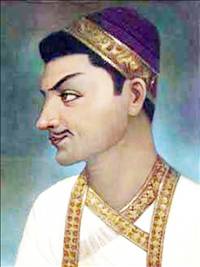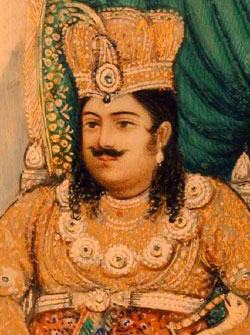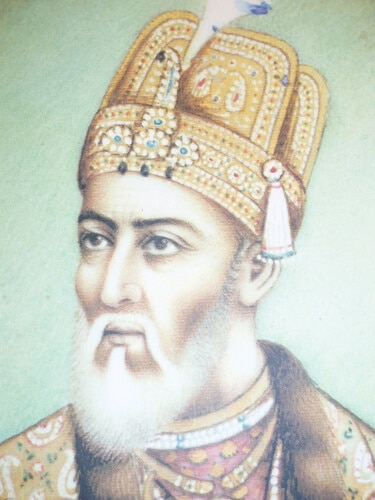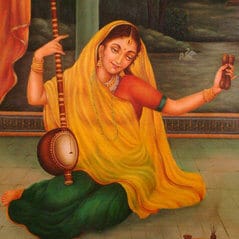Collections
Royal Poems Which Became Hindi Film Songs
Poetry has been the most romantic way of expressing one’s feelings in this part of the subcontinent. On top of it, poetry in Awadhi or Urdu sounds more romantic than the other languages. It sounds elegant, sophisticated and stylish. Urdu and Awadhi enhance the subtlety and refinement of simple sentences if expressed properly. It increases the intensity of one’s emotions. The languages of love, the languages of poetry. The Mughal era and the Colonial India witnessed, the glory of this poetry, shayaris or songs, to the hilt. With mushairas, traditional ghazal baithaks and even the courtesans reciting the choicest of the poetry, it evolved to become more intimate and personal method. Mushairas accompanied with paan, hukkahs and refreshments, represented the essence of friendly competition and esprit de corps. The verses and the couplets inspired the members and the appreciations and waah waahs went on from dusk till dawn.
The intensity of this culture was such that it became legendary. It became a trend, even the royalties were enthralled and captivated by it. They were bewitched and some of them even developed the skill of writing poetry and shayaris themselves. Nawab Wajid Ali Shah, Quli Qutub Shah and Bahadur Shah Zafar are the finest examples of these. Hindi films always have been known to be inspired by Indian literature and works of great men. Even its music has been inspired be it lyrics or folk tunes or the raag and melody.
Shown below are such examples of Hindi film songs which are based on the literary works/ poetries of the rulers in India – Nawab Wajid Ali Shah, Quli Qutub Shah and Bahadur Shah Zafar who had the knack of writing. Royal poems which became Hindi film songs.
1. Piya Baaj Pyala Piya Jaaye Na – Quli Qutub Shah –
Mohammed Quli Qutub Shah (1580 – 1611) was the fifth ruler of the Qutub Shahi dynasty of Golconda and the founder of the city of Hyderabad. He is said to have erected monuments in the name of his 12 beloveds, and he celebrated his romance with them in his poetry separately. He wrote in Persian, Telugu and Urdu and is said to have at least fifty thousand shers to his credit. He was a great patron of fine arts, architecture and music. He is also credited as the first Urdu poet to have compiled and published a Divan. Piya Baaj Pyala is amongst his most celebrated works. It has various non film versions which are composed by Khayyam, Muzaffar Ali etc. Its film version was adapted for Shyam Benegal’s Nishant (1975). Rendered by Preeti Sagar and composed by Vanraj Bhatia.
The non film version rendered by Chhaya Ganguly and Iqbal Siddiqui is also widely appreciated.
Another Khayyam version rendered by Jagjit Kaur and Talat Aziz.
https://www.youtube.com/watch?v=_H67bkIPIwk
2. Babul Mora Naihar Chhuto Jaaye – Nawab Wajid Ali Shah –
Nawab Wajid Ali Shah (1822 – 1887) was the 10th and the last ruler of the state of Oudh, present day Uttar Pradesh. He was a great promoter of dance, music and theatres. He himself was a poet, playwright, dancer and a patron of the arts. He wrote under his pen name Qaiser and also used a pseudonym Akhtarpiya. He wrote over 40 poems, prose and thumris. He ascended the throne in 1847 and ruled for 9 years, till it was annexed by the British. The Nawab was then exiled to Garden Reach in Metiabruz, then a suburb of Kolkata. It was during this exile that he wrote his most celebrated work – Babul Mora. His expression of grief, while leaving his beloved motherland. He used the words as a metaphor for bidaai – a bride leaving her father’s home. The most well known film version of this poem is that from Street Singer (1938) rendered by K.L.Saigal and composed by R.C. Boral. This version was sung live on camera since there was playback singing during those days.
Years later it was adapted in Avishkar (1974) which was directed by Basu Bhattacharya. This version came forward as romantic ghazal composed by Kanu Roy and rendered by Chitra Singh and Jagjit Singh.
https://www.youtube.com/watch?v=FImnFvwuPfg
Pandit Bhimsen Joshi popularised the non film version of the song, though Kishori Amonkar version is also well known.
https://youtu.be/o9PRkIZFLuY
3. Lagta Nahin Hai Dil Mera – Bahadur Shah Zafar –
Bahadur Shah Zafar (1775 – 1862) was the last Mughal Emperor and coexisted as a shayar with Zauq and Mirza Ghalib. His real name was Mirza Abdul Muzaffar Mohammed Sirajuddin and he was titled as Bahadur Shah, while he chose Zafar as his pen name. He had deep interest in poetry, music, spiritualism, and calligraphy. He ascended the throne at the age of 62, for an empire which was fast vanishing and had lost its glory. During the 1857 uprising, he was arrested, imprisoned while his three sons and a grandson were beheaded. In 1858, he was deported to Rangoon, now Yangon, the capital city of modern day Myanmar. Being a sensitive poet, his poems express sufferings, pity, agony and pathos. Lagta nahi hai dil mera is one such from his collection of poems. Laal Quila (1960) has the film version of this poem, rendered by Mohammed Rafi and composed by S N Tripathi.
A non film version of this song was adapted in the Doordarshan serial Bahadur Shah Zafar, where Ashok Kumar played the character with aplomb. The song was rendered by Mahendra Kapoor.
After reading the above article, one of the readers, Indrayani Deshpande, suggested the name of Meerabai who was not only a great poet but also a princess.
4. Jo Tum Todo Piya – Meerabai –
Meerabai born 1498 CE, was born into a Rajput royal family of Kudki district of Pali, Rajasthan. Though she married Rana Kumbha ( also known as Bhojraj) of Mewar, she considered herself the wife of Lord Krishna. Choosing the language of the people, Meera wrote in Vrajbhasha, interspersed with Rajasthani. There are around 1000 padas contributed to her. Songs which poured out of her while she was still in ecstatic state. One of her popular bhajans Jo Tum Todo Piya has been adapted at least thrice in Hindi films.
Jhanak Jhanak Payal Baje (1955) – Music – Vasant Desai, rendered by Lata Mangeshkar
https://youtu.be/UQIO-SNvEe4
Meera (1979) – Music – Pandit Ravi Shankar, rendered by Vani Jairam
https://youtu.be/TnUwm5ao7G8
Silsila (1981) – Music – Shiv Hari, sung by Lata Mangeshkar





P rama krishna
February 8, 2017 at 10:05 am
Though other songs are heard , it is a new information for me to know that our Hyderabadi quality Qutub shah wrote so many poems. Thanks DEEPA Ji. It is a good collection.
Deepa
February 8, 2017 at 5:06 pm
Thank you for reading and appreciating. Quli Qutub Shah was indeed a very fine poet. You can find some of his poems on the Urdu websites 🙂
Parmiela Bhagwandin
December 5, 2017 at 3:53 am
Piya Baaj Pyala was wonderfully sung by Mansi Multani in the play Piya Behrupiya. I was looking where this poem was from. Thank you so much for these information.
Vijay Kumar Jai
November 20, 2018 at 3:05 pm
You could also add “Na kisi ki aankh ka noor hoon” penned by Bahadur Shah Zafar, sung by Mohd Rafi in the film Lal Qila.
Deepa
November 21, 2018 at 6:58 pm
Yes that could have been added but one song from the film is already there 🙂
Narendra G Mehta
May 31, 2019 at 9:23 am
Impressed me details given. I select more songs of movies
Before 1970. But such details first time reading.
Thanks a lot.